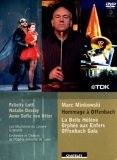![Gluck: Iphigénie en Aulide/Iphigénie en Tauride [Blu-ray] [2013] [Region Free]](/pictures/1166869.jpg) Gluck: Iphigénie en Aulide/Iphigénie en Tauride | Blu Ray | (27/01/2013)
from £29.33
| Saving you £N/A (N/A%)
| RRP
Gluck: Iphigénie en Aulide/Iphigénie en Tauride | Blu Ray | (27/01/2013)
from £29.33
| Saving you £N/A (N/A%)
| RRP ![The Pornographer [2001]](/pictures/1006006.jpg) The Pornographer | DVD | (23/09/2002)
from £11.69
| Saving you £8.30 (71.00%)
| RRP
The Pornographer | DVD | (23/09/2002)
from £11.69
| Saving you £8.30 (71.00%)
| RRP An art house movie that asks questions about the morality of art both on and off screen, The Pornographer is a hard-hitting yet strangely unmoving film. Very much a product of the French school of intellectual cinema, the filmmaker of the title is Jacques Laurent (played by Jean Pierre Leaud), a one-time director of adult films who, finding himself down on his luck, is forced to return to his old medium. Far from being a gaudy Boogie Nights style exposé of an unknown world, the film focuses on Laurent's inner turmoil and his rapidly disintegrating relationship with his wife, as well as his restored one with his son Joseph (Jeremie Renier). Director Betrend Bonello handles this material well, if overdoing the art house clichés a little, but the problem with the film (or for some its strong point) comes with the fairly hardcore sex scenes, presented as part of Laurent's movie. While intended to reflect the emptiness of the character's soul, it is hard to see past them as just an attention-grabbing device. Then again, can a film about pornography legitimately not feature sex? One suspects that this debate will run and run and, in its way, The Pornographer has much to say on the subject. On the DVD: The Pornographer's intended release fell foul of the BBFC, who objected to one particularly explicit scene, a continuing argument that provides much of the material for the DVD's extra features. There is a reproduction of the BFFC ruling, a statement in reply from Bonello (which demonstrate the similarities he shares with his fictional counterpart, certainly when it comes to a vision of erotica) and an excellent essay from critic Pierre Perrene. In addition there are biographies, the cinematic trailer and an option to view the film with or without English subtitles. Whatever the moral questions involved, Bonello's film is a visual treat and his stylish eye is well represented by this format. --Phil Udell
![Shank [DVD] [2008]](/pictures/1097739.jpg) Shank | DVD | (02/11/2009)
from £18.35
| Saving you £-3.36 (N/A%)
| RRP
Shank | DVD | (02/11/2009)
from £18.35
| Saving you £-3.36 (N/A%)
| RRP  Fiesta | DVD | (31/10/2005)
from £3.99
| Saving you £12.00 (300.75%)
| RRP
Fiesta | DVD | (31/10/2005)
from £3.99
| Saving you £12.00 (300.75%)
| RRP A compelling study of the seductive powers of fascism and violence directed by Pierre Boutron. The film looks at the deeply disturbing world of the Spanish Civil War and follows a young military cadet who is ordered to join the firing squad.
![Essential Opera Collection [Various, Various] [Opus Arte: OAMO6000D] [DVD] [2013]](/pictures/1161435.jpg) Essential Opera Collection | DVD | (11/10/2013)
from £81.56
| Saving you £N/A (N/A%)
| RRP
Essential Opera Collection | DVD | (11/10/2013)
from £81.56
| Saving you £N/A (N/A%)
| RRP ![Carmen [2003]](/pictures/1028405.jpg) Carmen | DVD | (12/02/2003)
from £26.95
| Saving you £3.04 (11.28%)
| RRP
Carmen | DVD | (12/02/2003)
from £26.95
| Saving you £3.04 (11.28%)
| RRP All too often Bizet's great comic opera Carmen has been pared down to its basic bodice-ripping components, leaving its adored melodies with only torrid clichés to cling on to. Nothing of the sort happens here. David McVicar's 2002 production for Glyndebourne restores it to its rightful place as a stupendous musical entertainment. Bold, lusty, tightly directed and designed in sanguine shades of red and black, this Carmen spills and bustles across the stage and out of the screen like a living painting. At first glance, Anne Sofie von Otter is not an obvious choice for the title role, but just look at how she seizes and inhabits the character, wrenching her from the jaws of dark, sultry stereotype and rendering a complex modern woman. Her Carmen both revels in and is tormented by the ripe sexuality that fascinates her lovers and sets her apart from the other women. Von Otter's interpretation suggests it has its roots in a hinterland of wretched, bitter experience; the "Habanera", the "Gypsy Song" and the "Seguidilla" become multi-layered expressions of hope and desire: we never forget that for all its gusto, Carmen ends up a tragedy. And the men aren't ciphers. Laurent Naouri's proud Escamillo and Marcus Haddock's immature, damaged Don José are rounded, richly sung characters. So too, is Lisa Milne's touching Micaëla. All told, this Carmen is full-length, fibrous and, with conductor Philippe Jordan at the helm, a triumph. On the DVD: Carmen is spread over two discs, presented in anamorphic widescreen format that opens up the stage and capitalises on some refreshingly brisk camerawork. The sound quality (Digital Surround sound) is finely balanced. A rich set of extras includes fascinating short documentaries on various aspects of the production, from stage fights to characterisation and costume design. There's also a useful spoken synopsis and a stroll through the famous Glyndebourne Gardens. --Piers Ford
![Bizet - Carmen (Jordan, Mcvicar) [Blu-ray]](/pictures/1088918.jpg) Bizet - Carmen (Jordan, Mcvicar) | Blu Ray | (29/09/2008)
from £25.89
| Saving you £4.10 (15.84%)
| RRP
Bizet - Carmen (Jordan, Mcvicar) | Blu Ray | (29/09/2008)
from £25.89
| Saving you £4.10 (15.84%)
| RRP Carmen
![A Concert of Music by Offenbach / Les Musiciens du Louvre, Marc Minkowski, Théâtre du Châtelet [2001]](/pictures/1028430.jpg) A Concert of Music by Offenbach / Les Musiciens du Louvre, Marc Minkowski, Théâtre du Châtelet | DVD | (02/12/2002)
from £N/A
| Saving you £N/A (N/A%)
| RRP
A Concert of Music by Offenbach / Les Musiciens du Louvre, Marc Minkowski, Théâtre du Châtelet | DVD | (02/12/2002)
from £N/A
| Saving you £N/A (N/A%)
| RRP Offenbach composed over 100 operettas, and yet is primarily remembered now only for The Tales of Hoffman and for having written the "Can-Can". This live Concert of Music by Offenbach aims to put the record straight and show that at least some of his other works deserve the chance to be staged. Fortunately the composer has found almost ideal advocates in conductor Marc Minkowski and mezzo Anne Sofie von Otter. The latter takes a respectful but unstuffy approach to the scores (the orchestral numbers Souvenirs d'Aix-les-Bains and the Barbe Bleue Ouverture are played with exquisite attention to detail, especially in some sighing woodwind solos) and von Otter shows that she is as great a comedienne as she is a singer. From the blowsy Grande Duchesse de Gerolstein declaring her love for soldiers in tight uniforms to the outrageous yodelling of the Colonel's Widow from La Vie Parisienne, she hits just the right note of inspired lunacy and frothiness. And there are some delicious costume changes too, including a grotesque bumpkin hat that's almost as big as the mezzo herself ("Duo des Alsaciens"). There's even more unintentional comedy in the English subtitles, which must be among the worst ever produced: "myself every night what I do coming here to seat" is one solipsistic oddity. Oliver Becker directs well for the small screen, capturing the fizz of a lively event. On the DVD: A Concert of Music by Offenbach is presented in 4:3 ratio, with LPCM Stereo, AC3 Digital 5.1 and DTS 5.1 sound options. The picture quality is fine, although the foreground and background of the stage seem to be presented in one rather flat surface. There are subtitles in English, German, French, Spanish and Italian. --Warwick Thompson
 Offenbach Gala 2001 | DVD | (26/02/2007)
from £N/A
| Saving you £N/A (N/A%)
| RRP
Offenbach Gala 2001 | DVD | (26/02/2007)
from £N/A
| Saving you £N/A (N/A%)
| RRP Recorded at the Theatre Musical de Paris - Chatelet, December 2001.Contains excerpts from:- La Grande-Duchesse de Gerolstein.- Fantasio.- Le Carnaval des revues.- Madame l'Archiduc.- Les Contes d'Hoffman.- La Belle Helene.- Barbe-Bleue.- Lischen et Fritzchen.- La Vie parisienne.- La Fille du tambour-major.- La Perichole.- Orphee aux enfers.- Souvenir d'Aix-les-Bains.- Ouverture a grand orchestre.
 Offenbach - Homage To Offenbach | DVD | (27/11/2006)
from £N/A
| Saving you £N/A (N/A%)
| RRP
Offenbach - Homage To Offenbach | DVD | (27/11/2006)
from £N/A
| Saving you £N/A (N/A%)
| RRP 
Please wait. Loading...
This site uses cookies.
More details in our privacy policy